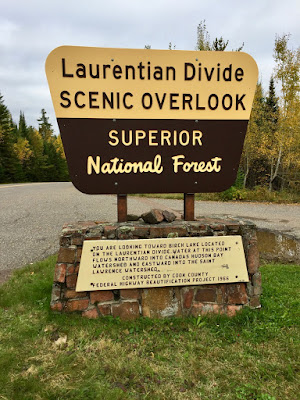Montana, another state whose name begins with "M," and also a state where mining issues are becoming more contentious, has an initiative, I-186, that would modify that state's current mining laws in a way that, among other things,
Places the burden of proof on the Montana Department of Environmental Quality to find, in writing and based upon clear and convincing evidence, that proposals for new mines will not cause perpetual water pollution problems.
 |
| which way would Twin Metals' waters flow
Photo by J. Harrington
|
That last phrase reads to us as if it could help address some of the issues related to the mine development proposed for PolyMet's NorthMet project and the Twin Metals development. From what we've read, the evidence available on PolyMet is neither really clear nor convincing. Financial assurance isn't enough, in our opinion, for a variety of reasons, up to and including uncertainty about where and how potential any catastrophic failures might fit into any financial assurance provisions.
As part of the supporting information in favor of the I-186 initiative, a description of the status quo reads much too much like what we believe about Minnesota's status for us to have any degree of comfort about how mines and mining are and will be overseen in our state's future. Here's what's claimed:
Currently, newly proposed mines are supposed to prevent pollution from entering Montana’s waterways. Unfortunately, due to insufficient enforcement and lax legal standards, this hasn’t happened. Mines such as Zortman-Landusky, Montana Tunnels, and Beal Mountain have become permanent sources of pollution, the companies have gone bankrupt, and taxpayers have spent millions of dollars treating contaminated mine water (and will do so forever).
 |
| St. Louis River between PolyMet NorthMet and Lake Superior
Photo by J. Harrington
|
It remains beyond our comprehension why the owners, investors and managers of both PolyMet and Twin Metals haven't taken an initiative themselves and committed to join the United Steelworkers, ArcelorMittal, Microsoft and others by participating in the Initiative for Responsible Mining Assurance's Launch Phase. Starting a new kind of mining in Minnesota, in locations that could severely degrade some of the state's most revered natural resources, warrants "belt and suspenders" levels of protection. We're not likely to achieve that with our business as usual approach nor with a win-lose process wherein we perpetuate an unnecessary and ill-founded jobs vs. the environment conflict.
We doubt that Montana's water resources are any more valuable to them than Minnesota's Lake Superior and Boundary Waters are to Minnesotan's. We are equally doubtful that Minnesota's mining regulators are much more rigorous than Montana's. We think the new and emerging processes offer much more potential for avoiding mining contamination than what we have now. We also believe that the demands for sustainable supply chains will continue to grow. What we don't believe is that it is wise for Minnesota to continue to ignore international standards that move the world toward sustainable mining and continue to rely on the same old same old processes in a new world facing a new normal.
Perpetuum Mobile
By Marin Sorescu
Translated by Michael Hamburger
Between people’sidealsand their realizationthere is alwaysa greater dropthan in the highestof waterfalls.This potential gradientcan be exploitedrationally,if we build a sort ofpower station above it.The energy it supplies,even if we use it onlyto light our cigarettes,is somethinganyway;for while one is smokingone can very seriouslythink upideals even crazier.
********************************************
Thanks for visiting. Come again when you can.
Please be kind to each other while you can.
No comments:
Post a Comment